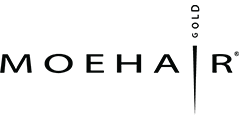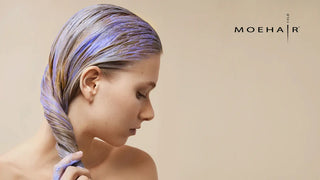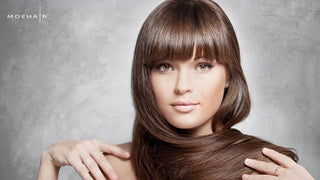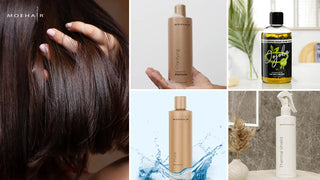 Table of contents
Table of contents
Dealing with dry, frizzy, or damaged hair can feel like a never-ending battle. From daily exposure to pollution and humidity, your strands go through a lot - often leaving them weak, dull, and craving some serious TLC (tender loving care). If your regular conditioner isn’t cutting it anymore, it’s time to level up your hair care routine with a hair mask. Dr. Oma N. Agbai told USA Today, “Hair masks are composed of moisturizing agents, oils, proteins, and other beneficial ingredients, designed to nourish and repair your hair.” In this guide, we’re breaking down everything you need to know about hair masks. Let’s dive in!
What is hair mask?
A hair mask is an intensive conditioning treatment designed to nourish, repair, and strengthen the mane. Unlike regular conditioners that provide surface-level hydration, hair masks penetrate deeper into the hair shaft, delivering essential nutrients and moisture. These deep-conditioning treatments are infused with rich ingredients like natural oils, proteins, vitamins, and botanical extracts. They work by repairing damage, improving elasticity, and enhancing overall vitality.
Hair mask vs. conditioner
A common question is, Do I need a hair mask if I already use a conditioner? While both aim to improve hair texture and manageability, they serve different purposes.
| Feature | Conditioner | Hair Mask |
|---|---|---|
| Purpose | Provides daily hydration and smoothness | Deeply nourishes and repairs hair |
| Penetration | Works on the outer layer of your hair | Absorbs deeper into the hair shaft |
| Application Time | 1-3 minutes | 10-30 minutes |
| Texture | Lightweight | Thicker and more-concentrated |
| Frequency | After every wash | 1-2 times per week |
Think of a conditioner as your daily moisturizer and a hair mask as a weekly spa treatment for your tresses.
Hair mask benefits

Hair masks offer numerous benefits, depending on their ingredients and formulation. Here’s why incorporating a hair mask into your routine can be a game-changer:
1. Intense hydration - Like your body, your hair needs hydration. A hydrating hair mask is your go-to haircare product that hydrates your strands and infuses them with much-needed moisture. This improves manageability and reduces dryness.
2. Deep moisturization - Hair needs moisture to stay healthy and maintain elasticity. It is also crucial for maintaining overall texture, especially for curly and coarse hair. Using a moisturizing hair mask coats the outer surface of strands and prevents them from losing moisture. This helps ease tangles and reduce frizz.
3. Smooths hair - Its restorative ingredients nourish hair, leaving it soft, smooth, and shiny. The formulation is absorbed through the cuticles, leaving hair frizz-free and smooth.
4. Repairs damage - Factors like overprocessing hair, excessive heat styling, and exposure to external aggressors damage your strands, making them prone to breakage. A hair mask delivers essential nutrients and revives damaged hair.
5. Strengthens hair - Bond-repairing hair masks, for instance, strengthen hair by mending broken disulfide bonds. This enhances hair quality, which restores normal growth and reduces breakage.
6. Helps with styling - A hair mask eliminates frizz, tames flyaways, and detangles knots, easing the styling process.
7. Boosts healthy growth - Hair growth masks are enriched with ingredients that stimulate follicles and boost circulation. As a result, it improves hair vitality and helps with unhindered hair growth.
Types of hair masks for different hair needs
Choosing the right hair mask depends on your specific concerns. Let’s break it down.
Hydrating hair mask for dry hair
Perfect for: Dry, brittle, and coarse hair
Key ingredients: Aloe vera, coconut oil, shea butter, and glycerin
This type of mask restores moisture, making hair soft, smooth, and manageable. If your hair feels straw-like, a hydrating mask should be your go-to.
Protein hair mask for damaged hair
Perfect for: Chemically treated, bleached, or weak hair
Key ingredients: Keratin, collagen, and silk proteins
Protein-based masks rebuild the hair’s structure, reducing breakage and split ends. However, avoid overuse, as too much protein can make hair stiff and prone to brittleness.
Hair mask for frizzy hair
Perfect for: Frizz-prone and unruly hair
Key ingredients: Argan oil, honey, and amino acids
Frizz-fighting masks smooth the hair cuticle and lock in moisture, preventing humidity from causing unwanted puffiness.
Hair mask for hair growth
Perfect for: Thinning or slow-growing hair
Key ingredients: Biotin, caffeine, castor oil, and rosemary extract
These masks stimulate blood circulation on the scalp, strengthening hair follicles and promoting healthy growth.
How to use hair mask for maximum benefits

Applying a hair mask correctly ensures you get the best results. Here’s a step-by-step guide:
1. Start with clean, damp hair - Shampoo your hair to remove dirt and product buildup. Excess oil can prevent the mask from penetrating effectively.
2. Apply generously - Take an adequate amount of the hair mask and distribute it evenly from mid-length to ends. If it’s a scalp mask, focus on massaging it into the roots.
3. Use a wide-tooth comb - To ensure even application, run a wide-tooth comb through your tresses. This helps distribute the product and detangle at the same time.
4. Let it sit - Leave the mask on for 10-30 minutes, depending on the product’s instructions. For deep penetration, cover your hair with a shower cap or warm towel.
5. Rinse thoroughly - Use lukewarm water to rinse out the mask completely. Avoid hot water, as it can strip moisture and cause dryness.
FAQs
1. How often should you use a hair mask?
- Dry, frizzy, or damaged hair - 2 times a week
- Normal hair - Once a week
- Fine or oily hair - Once every 10-14 days
2. Should you use a hair mask?
Absolutely! Whether you want to repair damage, boost moisture, or enhance shine, there’s a hair mask for every need.
3. Is hair mask suitable for color-treated hair?
Yes, several hair masks are safe for colored, bleached, and chemically treated hair. For example, Moehair Violet Deep Conditioning Hair Mask is exclusively crafted for blonde-colored hair.
4. Should you shampoo after using a hair mask?
Generally, you should shampoo your hair before using a hair mask to ensure better product absorption.
References
https://www.usatoday.com/story/life/health-wellness/2024/11/14/what-is-a-hair-mask/75898757007/
https://www.healthline.com/health/how-to-use-hair-mask
How we reviewed this article:
Our experts continually monitor the fashion and beauty space, and we update our articles when new information becomes available.
-
Current Version
-
April 01, 2025
Written and Edited By -
Saloni Sachdeva is a lifestyle writer with 5+ years of experience in writing in the beauty and haircare industry.






















